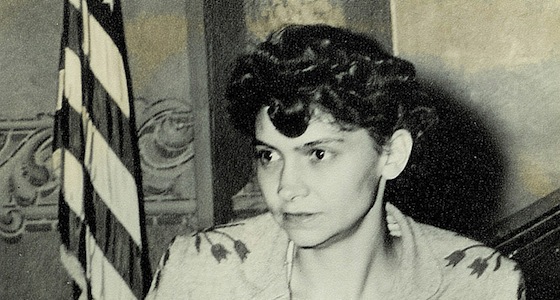
The Lord is Not on Trial Here Today
The real story of how separate of church and state in public schools became part of American law – and the courageous woman who made it happen
She was called "that awful woman" by her neighbors, and "that atheist mother" by newspapers across the country. Her friends stopped returning phone calls rather than risk speaking with her. She was branded a communist, and the Illinois State Legislature nearly outlawed her and her husband from ever working at the state university again. She received up to 200 letters a day, some of the writers claiming they would pray for her; many wishing for much worse.
All because, in 1945, Vashti McCollum would file a historic lawsuit that would forever change the relationship between religion and public school in America – and turn this young housewife from central Illinois into an unlikely champion of the separation of church and state.
About the documentary:
The Lord is Not On Trial Here Today is a Peabody Award-winning documentary that tells the compelling personal story of Vashti McCollum, and how her efforts to protect her ten year-old son led to one of the most important and landmark First Amendment cases in U.S. Supreme Court history — the case that established the separation of church and state in public schools. Little-known by the contemporary American public, the McCollum decision continues to have important ramifications for current conflicts over the role of religion in public institutions – from displays of the Ten Commandments in government buildings to student-led prayers at public school graduation ceremonies.

The film recounts what Vashti McCollum later described as "three years of headlines, headaches, and hatred," and the dramatic legal maneuverings that led to a decision that shocked the nation and made the McCollums a household name.
"When we look at the history of this country, and so much of it is built on these Supreme Court cases, what people don't always realize, and certainly people who study the law tend to overlook, is that behind every one of these cases is a personal story and probably a very deep involved personal story about a person or family who had to go through great hardships and show great courage and have all sorts of negative things happen to them for having the courage to stand up for one of these unpopular ideas. The constitution is not self-executing."
Filmmaker Jay Rosenstein
Trailer:
The task:
Kristin was asked to take the film out for a second run of broadcasts during "Women's History Month" a year after its initial release on PBS.
Despite the challenges of competition from PBS pledge pre-emptions as well as being a repeat performance, through Kristin's efforts, the film re-broadcast in 80% of the top ten markets. Nationwide, Kristin secured nearly 500 broadcasts throughout 61% of the US, making a broadcast of "The Lord is Not on Trial Here Today" once again available to viewers in nearly seventy million homes.
Press:
"Beautifully researched"
The Peabody Awards
"The movie is less than an hour long, but covers not only the forgotten legal basis of our current stab at a secular society, but a study of what a community can do to a family that insists its own theological beliefs are as valid as everybody else’s ... even if you are among the incredulous faithful — it is an hour well spent, and might help you wrap your head around the tough-for-some-to-grasp concepts of “other people” who believe “other things.”
Neil Steinberg, Chicago Sun-Times
"Beautifully rendered ...While the constitutional basis for the "wall of separation" is meticulously unpacked here, the issue is all the more compelling because of the way we see it play out in this narrative ... At a time when it seemed few in McCollum's conservative Champaign, Illinois community dared to question the connection between American ideals and patriotism, between patriotism and religion, between religion and Protestant Christianity, in that rush-to-judgment world, McCollum hit the 'pause button.' "
Chris Benson, Huffington Post
Awards:
Peabody Award for Research
Two Emmys from the Mid-America Region, for Best Historical Documentary and Best Writing.
Distribution:
PBS and ITVS, with funding from the Corporation for Public Broadcasting through ITVS, and the Illinois Humanities Council
Director's quote:
"The constitution says government institutions can't play favorites with religion," notes the film's award-winning writer-producer, Jay Rosenstein, associate professor of journalism at the University of Illinois at Urbana-Champaign. "That's really what the establishment clause says to me: all religions and non-religion have to be treated equally by the government. It wasn't until someone like Vashti McCollum stood up, went through all this financial hardship, emotional hardship, physical hardship, that that right suddenly got applied to the rest of us."
"And it's not just religion," Rosenstein cautions. "It's every aspect of difference. It's sexual orientation, it's kids who are gay and lesbian, everything. In a way, I kind of feel that what happened to (Vasti's son) was, in some ways, the same story that happens to every kid or every family who is different in some way."
(quote courtesy of Huffington Post)
The filmmaker:
Jay Rosenstein is a three time Emmy Award-winning independent documentary producer, director, writer, and editor whose work has been seen nationally on the PBS series – POV and Independent Lens, the ABC World News, ESPN, Nickelodean Channel, the Independent Film Channel, and film festivals worldwide including Sundance.
Narrated by:
Actor David Ogden Stiers, who played Charles Emerson Winchester III in the TV series “M*A*S*H”
The website:
jayrosenstein.com